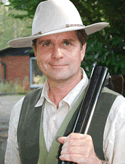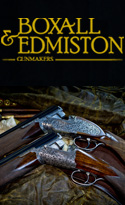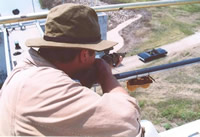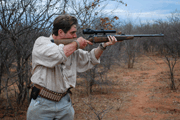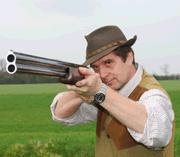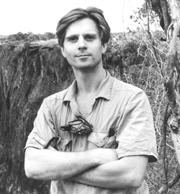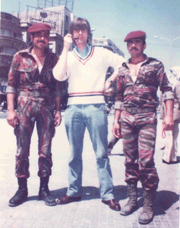Re-enacting the Trojan Horse
If you read my articles you are used to my eccentric globe trotting antics. I sometimes wonder what will happen when no-one wants to offer the chance to shoot doves in Timbuktu or presidents in Dallas. Some whilr back, I was in the ancient and beautiful Turkish city of Bodrum. Why? Not testing a new Turkish sporter, but, playing sergeant major, or, as the Turkish dailies and CNN Turk put it, being ‘the inglisi commando’ to a bunch of Turkish extras signed on to be Greek heroes in a Trojan horse epic. What else? To cast a little more light on this, a LA based production company working for Discovery Channel wanted to re-enact the Trojan horse ploy. As usual, it began with a call from Hollywood. “Mike, we want you to go to Turkey for us to train some Trojan Horse soldiers.” “Sounds like fun…tell me more.”
The job involved a flight to Istanbul, then another to Ismir (Smyrna as was – quite close to Huglu factory), then a long drive to Bodrum itself, a beautiful place on the Mediterranean coast of Turkey. I was to be officer commanding combined RSM at a selection test for would-be Trojan horse commandos. Those who passed would then have to tug the horse – constructed at a cost of $16,000 – through Bodrum city and place it in the courtyard of the crusader castle (our designated Troy). You can guess the rest. Keep quiet. Don’t move. Wait 24 hours. Drink wine from jugs. Piss in buckets. Nibble Feta. Open the gates. Despatch the guards. Sack Troy. Put the male population to the sword. Enslave the women. Carry off Helen. Get involved in an Odyssey etc…
Just in case this is not evocative enough. You remember that rather disturbing film The Wicker Man. This production had an echo of it - our horse looked pretty sinister, but there was no mad baronet of the Christopher Lee variety unless you count my Ulysses - combined with Carry On Cleo. Happily there was no human sacrifice, save for what I did to the recruits (see below). Our only potential starlet was the Turkish girl playing Helen, but she had a chaperone. The main characters in our saga were the producer, Richard Ross, director, Andy Papadopoulos, pete and jim the fim crew (camera and sound repsectively), myself, Tufan, our local ‘fixer’, and a cast of hundreds, well, dozens…well, just over a dozen but it is amazing what you can do with a bit of creative camera work.
The original idea, later abandoned, was that I should put the selected commandos thorough an assault course before and after their uncomfortable stint in the telegenic horse. The idea was a before and after confinement grading. Could it really have happened as suggested by legend? What would be the physical and psychological effects of a long stint in the horse? More on all that in a moment. Back to the selection test. Anyone who has passed through as many British Army selection tests as I have (the Guards depot, RCB, Sandhurst, and various regimentals etc.) is relatively well qualified to conduct one himself. Well, that was the attitude I took. Never refuse paid employment by film companies, especially in exotic and interesting parts of the world where all expenses are paid and there is a chance of sampling the local culture of an evening.
An ad had been put out for extras. About 50 people appeared at the appointed time on the terrace of our hotel and the event was covered as a national story by the Turkish media – TV, tabloid and radio. My initial role – before I went on to play psychologist and military expert within and without the horse – was to weed out the men from the boys in a specially devised selection. Those brave souls who passed the test, by then certified heroes, would be offered roles inside the horse for a filmed reconstruction of the legendary event. So, taking on board some elementary Turkish for effect, I came up with a pretty unpleasant routine which began with running on the spot and star jumps and moved on to press-up, sit ups and some especially unpleasant squatting exercises occasionally used in martial arts training in Asia.
“Welcome to Trojan wars gentlemen. We are looking for heroes.” I had a marvellous time - I always wanted to be an NCO rather than a commissioned officer. Remarkably, though I was quite tough with them, most of the recruits seemed delighted too. The secret was to keep everyone focused but smiling. I shouted, cajoled and brandished my swagger stick. I beat the marble, pushed chests to the floor, and demanded that knees be raised. About 25 lads made it through to the end. They were split into an A group for the horse and B group for minor roles. From then on I was responsible for a bit of fitness training and acclimatisation to the horse (the imposing nature of which is made quite clear in accompanying photographs). The log race on the sea front is an especially happy memory.
So, the great day came. We dragged the horse through town, and the Turks, no doubt like the original Trojans, were such a friendly lot that dozens of locals insisted on helping. We got the blessed thing in the courtyard of the castle and my guys then proceeded to phase II. Get in the horse, keep quiet and see who cracks first. We had food, water and a plastic bucket in one corner of the horse for calls of nature. There were also a couple of cameras to record everything that happened. It was all very war-ry to begin with. My guys had paid me the ultimate and touching compliment before getting in the horse: “Michael, you are good commander. We would fight for you.” This was a pretty good omen, but all that was required was absolute quiet under close observation.
It all went pretty well to begin with. I was using hand signals occasionally. No-one needed to be strangled as in the original story. Then, a couple of hours after H (horse) hour, one of the lads was caught short. He got up quietly and made his way to the official bucket in the horses hind quarters. I noted smiles. When the tinkle began, the smiles turned to suppressed giggles. Then his knees started to bend, the water flow went on and on an on. The knees bent again. Buttocks clenched. The inmates of the horses collapsed in collective laughter. Tears began rolling from a dozen pairs of eyes. Hands were placed over mouths. The Trojans would have cut all our throats in truth.
The test continued, however, in the name of science or Hollywood. I was asked to get out of the horse and comment to a TV camera as I watched a monitor. This was quite interesting, one less mature lad – by now a candidate for strangling – had started to talk. He was affecting the others, I removed him, and a while later a couple of others who lacked the requisite discipline for this unusual mission. The boys started to settle down after the bad apples had been removed. When the side of the horse was beaten with wooden poles during the night, nobody inside blinked. That was genuinely impressive. The modest training and the team spirit that I had tried to foster seemed to be working. The bottom line. There could have been a Trojan Horse, it is practically possible. But, you try keeping quiet and still for hours on end in a wooden box. It would have required heroes.
There is a postscript to this story. Visit Bodrum it is a beautiful place to chill, eat fish, dive and shop. I came across some interesting fake pepperbox revolvers and brought home some very reasonably priced meerschaum pipes and boxes. I also managed a bit of air pistol practice in an ancient garden. And, finally, your starter for ten – what did the Iliad do for shooting sports. Well, if W.W. Greener is to be believed, the spirit which moves us to break clay targets today and which motivated our sporting ancestors to shoot at glass spheres and at pigeons released from box traps, may be traced to the far older and rather curious practice of shooting at the popinjay - a stuffed, or live and tethered bird (usually of pigeon size, but sometimes larger or smaller) placed atop a mast or pole.
In Homer’s epic Iliad - written about 750BC - a dove is set atop a ship’s mast as a target for the archers of Achilles during funeral games for the fallen hero Patroclus:
“He set a mast up...at the sand’s edge, and tethered by a cord around one foot a rock-dove.
‘Shoot at that!’
The man who hits the fluttering dove may carry all the double-axes home. If someone cuts the cord he’ll miss the bird. Call it a poor shot! Second prize for him!”
Not a lot of people know that.


